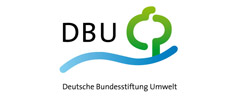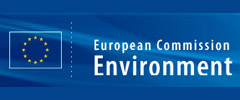Urine Diverting Dry Toilets
In a Urine Diverting Dry Toilet (UDDT), no water is used for flushing. The principle of a UDDT is to keep faeces and urine separated.
For this purpose special seats or slabs are needed, which safeguard the separation. Such slabs are industrially produced (e.g. in China, Georgia and Kazakhstan) but can also be constructed locally. After the separation the faeces are covered with an adsorbing organic material and kept directly in a special faeces chamber or in a container placed in the faeces chamber of the toilet.
The urine is stored in a tank. The volume of urine tanks for households usually ranges from 5–10 liter canisters to 1-2 m3 tanks. Generally 10 to 20 L canisters are common, as it allows the urine to be carried and applied easily on the fields. Larger tanks make longer storage periods possible, which can be helpful especially in winter, when application is more difficult and the fertilizing effect is less than in spring.
The seat of an industrially produced UDDT
Due to the separation, urine can be used easily and safely as fertilizer on a household level without extra sanitizing. If urine is used as fertilizer for commercial farming, higher infection risks are involved and therefore urine has to be stored at least for six months. In colder climates a longer storage time can be suggested. In this case two tanks can be used; the volume of one tank should be enough to collect urine for more than 6 months. Before faeces can safely be used, it have to be sanitized, i.e. pathogens have to be eliminated. This is achieved by different methods, such as alkaline treatment with ashes, adding soil and sawdust, and storing. During storing time, a dehydration and/or composting process takes place. The whole storage and/or composting time depends mainly on the temperature. The WHO Guidelines recommend 2 years for temperate climates (2-20°C).
More information:Videos:
- WECF made a five minute film about the operation and benefits of ecosan or urine diverting dry toilets (UDDT) in areas without reliable water supply. Watch No flush, No Waste here.
- WECF and Natracare made a two minute film about the positive impacts of ecosan toilets for school girls in Tajikistan.
- Ecological Sanitation and Hygienic Considerations for Women - Fact Sheet; information on how to clean UDDTs and information on menstruation and UDDTs. Also available in Russian.
- Urine- the Yellow Gold; safe re-use of human urine from ecosan toilets to increase your yields. Also available in Russian and Kyrgyz.
- Making Sustainable Sanitation work for women and men - integrating a gender perspective into sanitation initiatives; this publication gives background information on the pressing need to integrate a gender perspective into the efforts to promote safe and sustainable sanitation.
- Sustainable and Safe School Sanitation; this publication provides a background on on the important issues to make school sanitation sustainable. The focus is on UDDT systems. Also available in Russian.
- Safe and profitable toilets - a solution for health and wealth; WECF explains in this manual how safe toilets not only save you money but that sanitation and health are closely related. Also available in Russian.
- Ecosan - a new sanitation approach; this flyer gives an excellent overview of the issues surrounding ecological sanitation, such as the benefits, the environmentally-friendly characteristics, the different kinds of ecosan toilets and gender aspects of ecosan.
- Experiences with urine diverting dry toilets (UDDTs) for households, schools and kindergarten in Eastern Europe, the Caucasus and Central Asia (EECCA); this paper presents experiences with the implementation of urine diverting dry toilets (UDDTs) in the EECCA countries.
- WECF supports the placement of Ecosan toilets at the Kayenje Primary School in Uganda.
- Safe and Sustainable Sanitation for Women & Menstrual Hygiene; WECF and Natracare want to make a difference through building new sanitation facilities and educating people in rural areas of Eastern Europe, Caucasus and Central Asia.



































